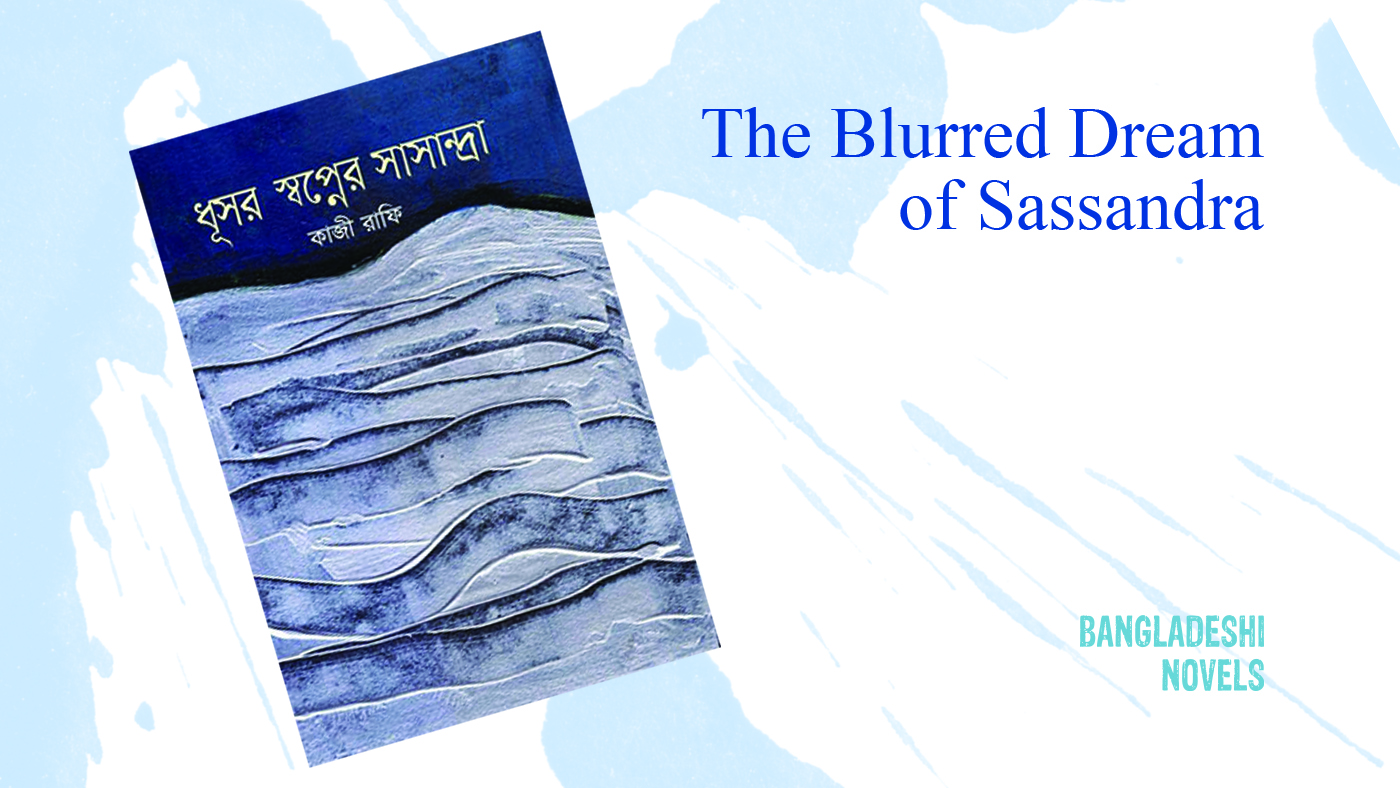The Chain
Imdadul Haque Milan
Translated by: Abedin Quader
Publisher by: Biddya Prokash, Dhaka
First Edition: 1993
Munim dropped in the evening and asked. “You are home in a Friday evening!” I had come back from work at five. It was six-thirty and I was still lying flat on the bed without changing. April had arrived, the beginning of summer. A soothing breeze had started blowing over Germany. Winter was about to be over. The skeletal trees had begun to dress up green with the advent of summer. Air in the gardens was getting thick with aroma. Good days were coming! Germany was getting greener. It would soon turn colourful. For the Germans, it was a lovely time no doubt.
But I was not feeling well that day. I was depressed, despondent. After getting back from work, I had opened the letter-box, like any other day. No letter, no one wrote to me for a long time. Mother, sister, brother, Setu, no one. Looked as though everyone had forgotten me! On the way back home, I had thought at least one letter must have come. But it didn’t know why. I expected one that day. But it didn’t. I was very upset. Letters from Bangladesh usually came on Tuesdays. So many Tuesdays had passed without any letters from home. I don’t know why. I expected one that day. But it didn’t come. Why didn’t Setu write? A full year was not yet over. Had Setu ditched me in such a little time? I climbed the stairs slowly, wobblingly, and got into my room on the sixth floor. I put the key in the lock, opened the door out of habit, with automatic hands. I felt more tired climbing the stairs than working the whole day. Felt completely exhausted, the most tired man on earth. I threw myself on the bed with my work-dress and shoes on. I felt really tired, disgusted. I couldn’t like anything at the moment.
Munim asked, ” why are you lying in the bed like a Shaheb? What happened?” Then I realized that I had not changed. Summer had come, but it was still quite cold in the morning. So I usually went to work wearing a coarse corduroy trousers, a jacket and long shocks and sneakers. I was wearing all these. I felt a bit embarrassed.
I got up from the bed and asked, “How do you do, my friend?”
“I was fine even a little while ago. Climbing the stairs was tiring, you know, I feel tired.”
Really! Working the whole day is less tiring than climbing these stairs! I am always apprehensive when I reach your home.” I felt embarrassed, and sat up on the bed.
“Have you noticed friend that the foreigners always get poor residence in Germany. All the Bengalis are condemned to live in the same type of houses. Old, damp, dilapidated. None of the houses has heating or lifts or hot water and the bathrooms are dirty. They consider us beggars. Really.”
I could sense Munim’s anger at the Germans since I arrived. He often spoke against the Germans, but had lived on here for all these years with a sign of returning home.
I asked, “How about a cup of Coffee?”
“No, lets go out.”
“Didn’t you have lunch?”
“No. Never felt like cooking after coming back home. I usually take bread, omelet and Coffee.”
“What do you take for dinner?” “Rice?”
Munim looked surprised, “You take rice only once?”
“Yes, we are served a good lunch in the canteen.”
“We have turned into perfect labourers.” Munim burst out laughing.
Munim is fair in complexion and slightly corpulent. His cheeks look like the boiled potatoes. He is short and stocky. His specs give an aging look to him.
He is of my age. We used to study in Jagannath College in Dhaka in the same class. That was a different life, we hardly remembered.
“I cannot help taking rice,” Munim said. “I’ve a shifting work. The noon shift is wonderful. I get up from the bed at about twelve, prepare my food and then start work from two thirty. I prepare vegetables for both lunch and dinner. And after I come back I only boil a packet of rice. It takes only ten minutes. Night shift goes in the same routine.”
“I prepare my meals in the morning and take a lengthy nap in the afternoon. I get up at nine in the evening, boil a packet of rice and take my supper. Then take the Asban (first train). The morning shift is however, really troublesome. I have to make up at four in the morning and run twenty-four kilometre in no time. I don’t like it at all.”
“Where’s your factory?”
“Eslinggum. Let’s go out.”
“Where?”
“Let’s get out first, then we’ll find out.”
“Wait a bit, let’s have a cup of Coffee.”
“How about having something at the MacDonald at Bunhop (Junction Station)!”
“I feel hungry now.”
“You just told me your canteen serves good food.”
“Well, that was one o’clock.”
“How many times do you get tiffin break?”
“Twice.”
“We are more lucky. Ten minute break for tiffin after every single hour. It’s because we work at a hot machine. We make car brakes for fifty minutes standing up all the time, and while away ten minutes for puffing cigarettes.”
Munim fished out a packet of Marlboro from his pocket. He put a cigarette between his lips and offered me one. I lighted the cigarette with an orange coloured lighter.
He asked. “Do you have to work for fixed time.”
“No, we don’t have a shift system.”
“Do you work for overtime?”
“Not even for a single minute.”
My stern answer surprised Munim. He stopped lighting his cigarette. Then he asked,
“Why?”
“Oh, don’t like it.”
“What’s your hourly wage?”
“Ten forty-five.”
“Then definitely you don’t get more than thirteen of fourteen hundred marks?”
“That’s about it.”
“How much do you save?”
This question annoyed me. I don’t like discussing money and salary.
Munim continued, “My wage is eleven. And then I work two hours overtime daily, which brings me about two thousand.”
“Good, let’s go.”
“It’s really stunning that we earn about fifteen thousand taka a month. Certainly we could not have earned four hundred a month in our country. Four hundred which equals forty marks. Hah, hah. . .!”
“We swig beer worth about three thousand take a month here.”
I changed into a round necked T-shirt and a blue coarse chord trousers. I put on a pair of new shoes, and threw away the stinking socks. I took a Cigar packet. When I climbed down the stairs, it was ten past seven.
Strolling on the street, Munim asked, “Can you remember when we met Kaisar?”
“About two months back, I think.”
“Yes”
“I had been to Stuttgart twice during this period but couldn’t drop into your place.”
“Is Velan Dorf out of Stuttgart?”
“No, possible in the outskirts. Like Mirpur is to Dhaka.”
I chuckled and said, “You are quite O.K. It’s better to stay in the outskirts in a good accommodation. You will never find a good place in Stuttgart. Luckily I got one, but it turned out to be no good any way.”
“What do you mean by ‘No good’. You live alone, isn’t it enough?”
“Don’t you see the condition of Tubinger Strasse? Eight or Nine guys live in single room and you wouldn’t even find a floor space during the night. Bengalis are horrible creatures!”
“What else can they do?”
“I heard a large number of Niksot Arbiters (those who don’t have work permit) are living in hotels now a days”.
“Yes”.
“Where do they take their meals?”
“They usually make arrangements with a Bengali Family for lunch and dinner.”
“How much do they get as Socialamoth (allowances from the Social Welfare Organisations)?”
“I believe its three hundred thirty six marks.”
“Oh god!” Can they live with it?
“Why not? Only food costs. They live in the hotel free with their Socialamoth Paper. Some Guys save enough from this to send home. Some work illegally in some hotels which earns them about three or four hundred marks.”
Munim heaved a long sigh and said, “We would have faced the same terrible situation if we did not come here earlier.”
I kept silent.
Munim said, “I’ll be back home at the end of this year.”
“Oh, you will !”I’ve been hearing this since I arrived.”
“One day we will have to go back. The German Government will drive us out. Don’t you see the OutslanduRaus (Drive away foreigners) processions already beginning? And why shouldn’t they? People are coming into this country in streams. They are playing havoc to the German Economy. If it continues, racism is bound to grow here as in England. I will move out before that. When my savings will reach three to four lakh I will be back and start a business in Dhaka.”
“What I’ll do in Dhaka with out having some savings! You know about the condition of my family!”
“Don’t you send any money home?”
“I used to send two thousand, now I send five thousand. My father has gone into retirement, house rent and other expenses have also gone up.”
There were many people in the street, as it was Friday evening. Cars with flashing colours were moving in silence. Buses with number plates at the top were stopping at their stoppages. Letting off and taking in passengers. Blonde youths were walking past at great speed, babbling distinct sweet sounds. People crowded on both sides at the approach of Thlinger Strasse. Pedestrians waited for the traffic light to turn green. On the other side of the road sex kinos (sex cinema halls) displayed pictures of copulating couples in red and blue light. There were peep-show halls on one side. They charged a mark a minute to see a nude woman. The place was overcrowded. Countless Pubs were scattered in the place which were getting crammed by thirsty customers from the early evening. Shops got closed at six sharp. Bars become full of customers after a short while and the Descotes (Disco) had then rush after nine. It’s the heaven for young boy and girls. We passed through all these like helpless onlookers. Everyone around us were unknown, none asked “How are you!” The Bengalis have peculiar characteristic look. They can be easily recognized by other Bengali. Even the Pakistanis and the Indians could be recognized at a glance.
But that evening we came through a long way without finding a single Bengali, Pakistani or Indian, Presently I saw a very bright, fair-complexioned German girl coming with a black American towards us. The American boy was more than six feet tall, pitch-black, wearing a skin-hugging white Jeans-trousers and shirt, talking in a rough noisy voice with the girl.
Walking briskly past us he said in a relatively low voice,” Hello.”
Munim answered back, “Hello.”
The German girl didn’t even look at us.
It’s a proud nation.
Munim said, “The Blacks are really good. They talk to the coloured peoples and always behave in a friendly manner. A black American works with me in my shift. The rest are all German. The black man gives a damn to the Germans.”
He made friend with me. The Supervisor can’t even submit to the Mistar (A higher post than supervisor). His name is Allan. The factory’s frightened of him.
“The Americans are the fathers of the planet. Shouldn’t they be afraid of him?” I said.
We had already reached Banhop. Munim lighted his cigarette. I did the same but I felt very hungry. I didn’t relish the Cigar.
Munim forced it on me.
“Let’s puff the cigarette, then we will get into a Macdonald. Smoking is prohibited in Macdonald.
“Is it?”
“Yes, Macdonald doesn’t allow smoking inside.”
“Since when.”
“About three months, don’t you know.”
“No. I haven’t been there for a long time. The Macdonald Company has already sensed that large number of foreigners had got into Germany. The buggers order for a cup of coffee and chat for hours and smoke ceaselessly.”
On the half way through smoking I threw away the Cigarette. “Let’s get in.” I said, “I am very hungry.”
In front of the burger place there were three steps leading to the footpath with a long queue of different shops.
The curved “M” of the Macdonald was lit a dazzling red before the shop’s display board and the crowded customers were having their mouths full of chow.
Munim crushed his cigarette with his foot and said, “This is rush hour, may be we’ll not find any table.”
Inside, we looked around. No table was empty. People were eating in a terrible crowded, small room. Most of them were young men and women. Some boys and girls were also having bigmacs. Some foreigners waited in the queue before the counter for cheaper priced dinner. German youths do not have a lot of money. They eat at MacDonald because it was cheaper. Foreigners earn fairly enough money, still they get into Macdonald. They cannot afford to be extravagant. They come here for earning money and would go back with sufficient savings. So they have to be penny pinchers.
Munim said with exasperation, “Heh! What can we do, there’s no table”.
At that moment a table with a single Bengali sitting near the toilet caught my eyes. All the tables around him were full. But he was sitting alone.
I nearly shouted, ‘There’s an empty one.”
“You go and sit there, I am bringing the food,” Munim said.
“Let me go, I am really hungry’, I said.
Munim smiled, “I have not yet become a foreigner. The Bengalis turn into practical fellows after they go abroad. They sit with you, even go on smoking but never offer you anything. Never, nothing. Sometime I do like this. But you are my friend. I should not pull the same thing with you”
I smiled and said, “please stop your lecturing, go and bring food, I am dead hungry.”
“What do you like?”
“Whatever you choose.”
“Bigmac.”
“No, fishmac for me.”
Munim moved towards the counter and I started walking to the table with the lone Bengalee. Suddenly it occurred to me that Munim talked too much now a days. Certainly much more than when I arrived. His talkativeness grew. Two or three other Bengalis I found in Germany talked endlessly. Why so? Do the people living abroad for a long time become talkative? Shall I also be talkative like Munim after two or three years? Once I start I shall never stop?
“Is it a curse of staying abroad? Immediately I tried to recall whether I used to talk as much as I did then”.
I felt a chill inside me. The Bengali young man looked at my face when I took a chair. He held a hamburger and two more were on the table with a big glass of coke. The young man was deeply, absorbedly in eating. I sat in front of him but he didn’t look at me any more.
But why was he taking so many hamburgers! I began to notice him, scrutinizing. A painfully broken face. His cheek bones were bulging out, his eyes were in the socket and with deep black rings around. The body was shielded by the dress but it could be assumed that the bones were coming out of his flesh like the iron-structure of dilapidated house.
It surprised me. The Bengali boys get healthy after coming to Germany. Why had this boy suffered so much ! Everything here goes with the watch, meals, work rest and sleep. On top of that the foods are absolutely pure without the slightest adulteration. Bengalis get greedy about ghee, butter and honey. A large basket of fruits cost only three marks which is the price of a packet of Cigarette. Nobody drinks normal water but fruit juice or beer. Some people regularly take red wine.
“Why was this boy so thin and obviously in bad health?”
I couldn’t really guess.
Munim was still at the counter. There was a long queue. Another ten to fifteen minutes before food arrived. I furtively looked at the counter and found Munim behind about fifteen people. Young counter girls were passing red plastic trays from the kitchen. They didn’t stop for a moment. Still they put on a decorated smile. So artificial as to invite-desdai…








